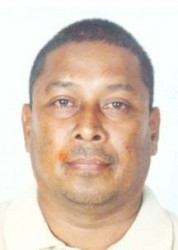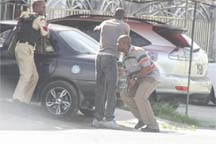The police yesterday said that all of the ranks deployed in the immediate area of the November 12, 2013 shooting rampage by Deryck Kanhai were fitted with protective body gear while some in the outer cordon were not so fitted but “relatively safe”.
In a statement, the police provided their most detailed account to date of the shooting rampage by miner Kanhai on November 12 which left him, two policemen and two others dead in a bullet-riddled afternoon that paralysed the centre of the city and created fear.
Following the shooting the police had been criticized for having ranks at the scene without protective gear, poor crowd control and haphazard targeting of Kanhai in his Middle Street residence.
The police said that the initial report received was that there had been a robbery at the Balwant Singh Hospital on East Street and that someone had been shot.
Later, the statement said, another report was received that a man was walking down Middle Street and shooting at members of the public with a shotgun. This man was later confirmed to be Kanhai and several eyewitnesses had also described this scene.

The police said that having heard the report through the radio network, Constable 18053 Sherwayne Pantlitz – who was later shot dead – along with two other ranks who were on anti-crime patrol on motor cycles, and who were all fitted with body protective gear, responded to the report. By this time, the police said that Kanhai had retreated into the Middle Street building where he lived and during efforts to make contact with him, Pantlitz was shot and killed.
The police said that two more ranks on motor cycles joined the others and they made “valiant efforts to control the converging crowd of persons and to divert traffic.”
Police reinforcements later arrived which included Divi-sional Commander, Assistant Commissioner George Vyphuis and a number of other officers. A command centre was established, the statement said, and cordons were established for public safety.
“It was a major task to divert traffic and control the large number of members of the public who had converged on the scene, instead of moving to areas of safety, while simultaneously concentrating on neutralising the threat posed by Deryck Kanhai.
“Senior officers continually engaged persons in the crowd urging them to remove to more safe distances, but they were generally non-cooperative and defiantly refused to move. Before metal barriers were sent for and placed at strategic points, police ranks were forced to hold hands and form a human barrier”, the statement said.
The statement added that there was no sharing of body armour as alleged by various reports since additional body armour was obtained and distributed to ranks on the ground.
“Also, there was no sharing or exchange of arms and ammunition at the scene as such action is in breach of the Standard Operating Procedures as it relates to the uplifting of arms and ammunition by ranks”, the police force said..
It said that law enforcers had to “adjust tactics and strategies as the incident unfolded in order to protect (from) further loss of life.”
Efforts were made by senior officers and other ranks to plead with Kanhai in a “language that he would clearly understand to give up and come out of the building”, the statement said.
“He was continually assured that no harm will come to him, but he responded with gunfire. This process continued for a prolonged period of time without success and during which Police Lance Corporal 20293 Michael Forde was shot and killed”. Observers had said that it did not appear as if the police invested in negotiating with Kanhai through family members and persons knowledgeable of negotiating strategies.
The statement asserted that law enforcement was at “some disadvantage” as Kanhai was in a building with windows of a type that prevented the ranks from seeing in, and he also had the use of closed circuit television (CCTV) cameras which had to be subsequently immobilised. While it was originally thought that Kanhai had access to the CCTV control room in his house and could target his fire as a result of this, it was later discovered that Kanhai had not had access to the area and was in a different part of his building.

The police said that a limited number of tear smoke grenades was used out of consideration for the hospital, other business places and residents in the area. This, the police said, proved futile and was discontinued. The cops had been strongly condemned for their use of tear gas as this had affected members of the public using the hospital, Furthermore, one of the canisters that was fired by the police at Kanhai was lobbed back at them by him.
The police said they were later able to enter Kanhai’s building after a key to one of the doors was provided by Kanhai’s brother Aubrey. “The situation was eventually brought under control”, the police said. They provided no more information on Kanhai’s demise. It had been speculated that Kanhai had either been killed by police bullets or had taken his own life.
The police added that residents in the area have been loud in praise for the actions of the force.
It also disclosed that during the operation two units from the Guyana Fire Service and personnel from the Guyana Power and Light Inc. were on standby.
The police confirmed that reports have been received of articles found missing from the building after the operation and these are being investigated. Relatives of Kanhai and tenants in the building had told Stabroek News that valuables had been stolen during the operation.
However, the police said that contrary to reports in the media which alleged that a licensed shotgun belonging to Aubrey Kanhai was missing, the firearm was taken by the police as part of the investigation process and this has been told to him.
The police added that In keeping with force policy, a review of the operation has been conducted and the lessons learnt are to be incorporated in its Standard Operating Procedures where applicable/necessary.









